Published Jan 7, 2020
Teaching My 2e Kid Social Skills with Star Trek: The Next Generation
Turns out, watching Data was the perfect way to 'learn how to human.'
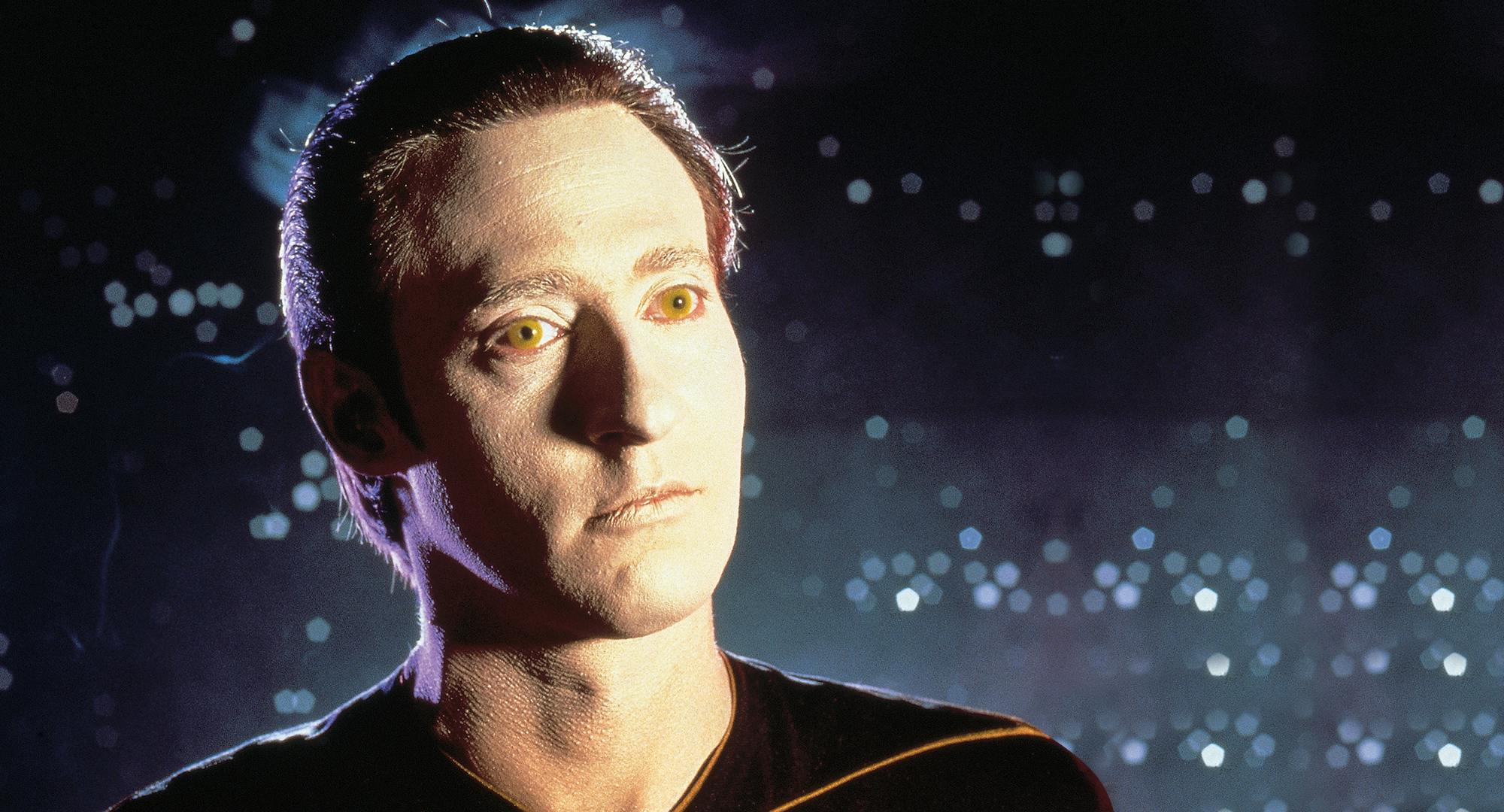
StarTrek.com
The crew of the U.S.S. Enterprise are locked in a deadly stand-off with an all-powerful alien life form known as the Nagilum. Preferring to end the lives of his entire crew rather than subject them to torture, Captain Picard makes the difficult choice to initiate the Enterprise’s self-destruct sequence. Riker confirms. The countdown begins.
“Wait,” my seven-year-old pipes up, prompting me to hit the pause button. “They aren’t even counting nanoseconds, are they? They aren’t.”
The crew of the Enterprise is about to wipe themselves off the face of the galaxy, and my child’s primary concern is the accuracy of the clock.
This was not a huge surprise. My oldest child (who requests that I refer to him by his gaming handle, “B-Bot”) has always been obsessed with numbers. He was counting before he could talk, carefully lining up his cheerios and grunting as he pointed to each in sequence. After mastering the art of speech, he demonstrated instant recall of virtually any number, in any context, and was frequently exasperated by others’ inattention to detail, such as the exact number of bites they had taken in the process of consuming a sandwich. I couldn’t say “I’ve told you this a thousand times!” without having him politely inform me that no, actually, it was only eight.
B-Bot is incredibly strong, extroverted, and endlessly forgiving, but has a hard time reading emotions beyond obvious physical reactions like laughter or tears. He is also hilariously literal. As a toddler, he once crawled around, barking. When I said, “Oh, are you a doggy?” he immediately sobered, got to his feet, and explained, “No. I a boy.” While childhood staple of ‘playing pretend’ was a nearly incomprehensible concept for him, we had hours-long conversations about atomic structure, chemistry, cancer, and the solar system. His family nickname is the Energizer Bunny, because he never rests. We joke that B-Bot doesn’t sleep — he waits.
Though we initially suspected B-Bot was autistic, his formal diagnosis was more complex. He is “twice exceptional” or “2e” — both highly gifted and learning disabled. B-Bot will never need anyone to teach him reading, mathematics, or science. He does, however, need help understanding his fellow humans.
What do you do with a hyper-intelligent being with super-strength who never sleeps but doesn’t understand the concept of lying?
You introduce him to Data.
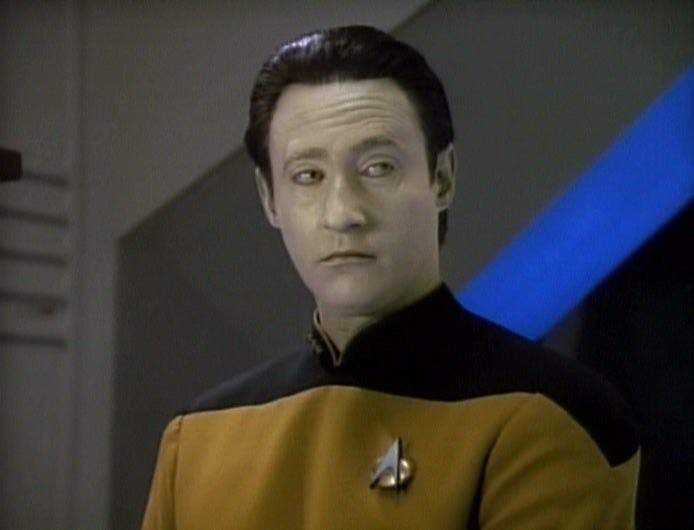
StarTrek.com
B-Bot was instantly captivated by the warp engines, tachyon beams, and photon torpedoes of Star Trek: The Next Generation. We spent the first several episodes reviewing the entire Starfleet command structure, because he needed to know exactly what all the uniform colors and collar pips signified. The wonderful thing about Star Trek, though, is that underneath all that riveting techno-babble, it’s really about people. And Data provides the perfect beginner’s guide to this inner world. Much like B-Bot, Data overflows with knowledge, regurgitates information ad nauseum, and hasn’t a clue what makes a joke funny. They had so much in common that B-Bot didn’t even realize Data wasn’t human!
In the beginning, I’d hit pause every time a character’s face expressed an emotion that wasn’t explicitly referenced in dialogue. I’d ask something like, “How is Captain Picard feeling about Data?” Most of the time, B-Bot wouldn’t know. We’d discuss how Picard needed to act quickly, and he was annoyed that Data was slowing him down by providing too much information. (Is that even a thing?!)
When two characters shared a steamy kiss — I don’t recall the exact scene, but I’m sure it involved Riker — B-Bot wrapped his arms around my neck and attempted to duplicate the gesture. He hadn’t a clue that what he’d seen on TV was intended to be romantic, or how such affection differed from the love between a mother and child. Fortunately, B-Bot wasn’t the only one puzzled by mating rituals. Data’s attempt to date another crew member in “In Theory” walked B-Both through the basics of romance: Who’s involved? What do romantic partners do for each other? How is a romantic relationship different from friendship? B-Bot was riveted.
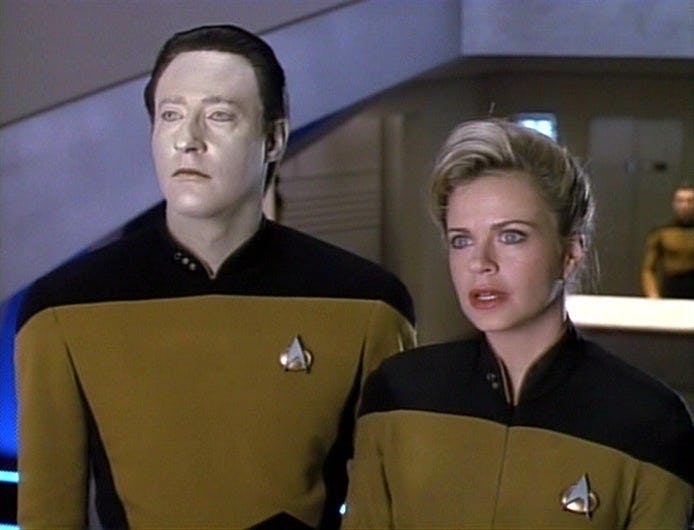
StarTrek.com
As casually brilliant as B-Bot is, I worried about his attitude towards others. How do you teach humility to a child reading Ender’s Game while his peers are sounding out the ABC’s? This is where Data’s example was critical. Yes, he knows a lot. But — unlike his brother Lore — he never considers himself superior to others. TNG gives as much weight to Deanna Troi’s emotional intelligence as it does to Data’s scientific expertise. Data acknowledges his weak spots, and rather than dismissing them as irrelevant, he adopts an attitude of constant learning and growth. Just because Data can’t feel emotions doesn’t make them unimportant. Quite the opposite!
Data’s relationship with his brother was also enlightening. He’s repeatedly hoodwinked by Lore’s duplicitousness, offering him chance after chance at redemption. B-Bot had similar issues with classmates. When a “friend” insisted that acceptance must be purchased with candy, he dutifully handed over the treats I had packed in his lunch. Dessert seemed like a small price to pay for inclusion. Data, however, demonstrates that small concessions can have very large consequences. In “Descent,” though he initially believes experiencing emotion is worth compromising his ethics, Data soon realizes it’s not only his own wellbeing at risk — when he accedes to Lore’s manipulation, he nearly kills his best friend.
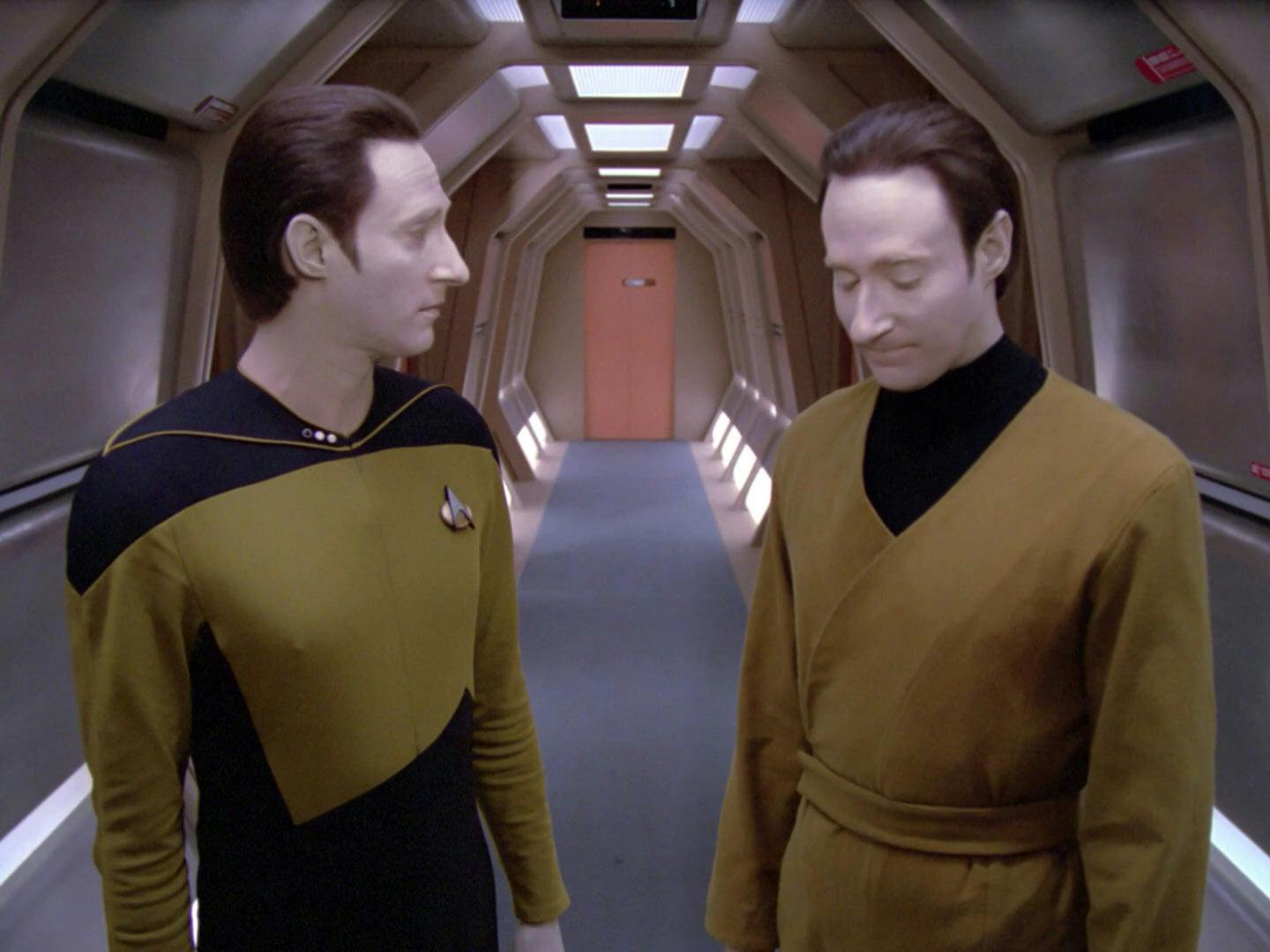
StarTrek.com
Still, I did not want B-Bot to conclude that the mistakes of his 7-year-old peers automatically made them “bad guys” — especially since, at that point, he made zero distinction between a friend’s fanciful embroidering of facts (this marble is the most valuable gem in the world) and intentional deception. To his very literal mind, both were equally false. Fortunately, in Star Trek, as in life, most conflict stems not from bad guys doing bad things, but from misunderstandings between well-meaning people. In the classic “Darmok,” it’s a language barrier. In “Galaxy’s Child,” it’s the crew of the Enterprise — the good guys! — who accidentally kill a rare creature after misinterpreting its actions. The colonists in “Up the Long Ladder” see stealing cells as their only path to preserving their way of life. Likewise, most of the conflicts B-Bot encountered at school were largely not bad kids being mean, but differences in culture and communication. The solution was almost always to try and see the situation from a different point of view — a skill that Data, who is different from everyone, models constantly.
Mirroring Data’s curiosity, B-Bot became progressively more interested in other characters as the seasons progressed. Suddenly we were having discussions about how, like Wesley, B-Bot’s path in life might involve unexpected detours. Worf’s fatherhood prompted talks about how parents are fallible, too. Captain Picard demonstrated that following orders is good, but that it’s more important to do the right thing. Riker is an example of enthusiastic consent. And Geordi taught B-Bot that diversity — including disability — is an asset.
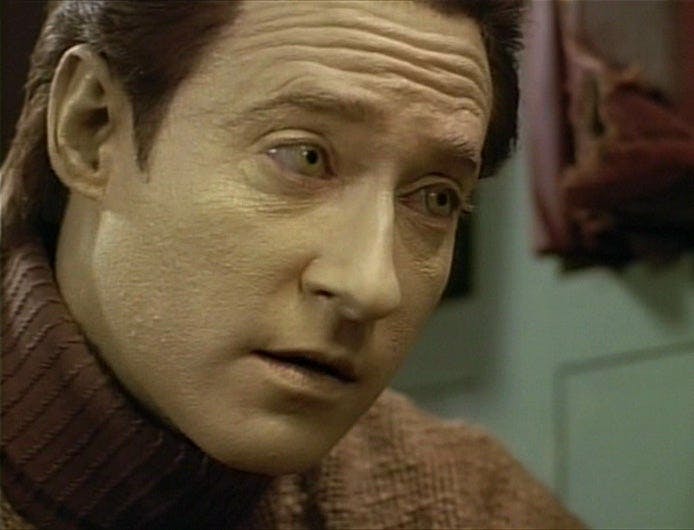
StarTrek.com
But B-Bot wasn’t just engaging with TNG’s moral lessons. He was studying personalities and facial expressions. By the time we reached the later seasons of TNG, B-Bot’s understanding of people, both on screen and off, had blossomed. Not only could he read nonverbal communication well enough to detect an impending kiss, he would slap his hands over his eyes and groan, “Eeew! Tell me when it’s over!” Which is, of course, a delightfully typical response for an 8-year-old boy. At school, he learned to look for the motives behind his classmates’ embellishments. He grew confident enough to seek out new friendships with kids willing to truly accept him for him.
Though we’ve finished watching all seven seasons of Star Trek: The Next Generation, I know my son’s future holds one final life lesson from Data. Even in a galaxy populated by celestial wonders, aliens, and beings with powers approaching god-like status, Data is undeniably different. And because of that difference, he inevitably faces prejudice. Not just from outsiders, but from people like Dr. Pulaski and other bipeds who choose not to “believe” in his personhood. In “The Measure of a Man,” we discover that the Federation itself, supposed beacon of enlightenment, considers Data property.
Unfortunately, the world is littered with people who will question my son’s worth, discount his experience, and belittle him for the things he is not. When that happens, I hope he will remember that while Data handled intolerance with grace, he also never questioned his own value or surrendered his claim to the same rights and dignities afforded to his peers. I hope he knows that for every Pulaski there are ten Picards and Rikers and Geordis willing to fight for his rights. And just as Data alone advocated for the newly sentient exocomps in “The Quality of Life” — I hope B-Bot will step up and speak out for those whose voices have yet to be heard.
Jude Hosts a Paint-Date With Isa Briones
Ramsey Hootman (she/her) writes quirky contemporary fiction about rejects and nerds. She is the author of Courting Greta and Surviving Cyril. Find her on Twitter @RamseyHootman.
